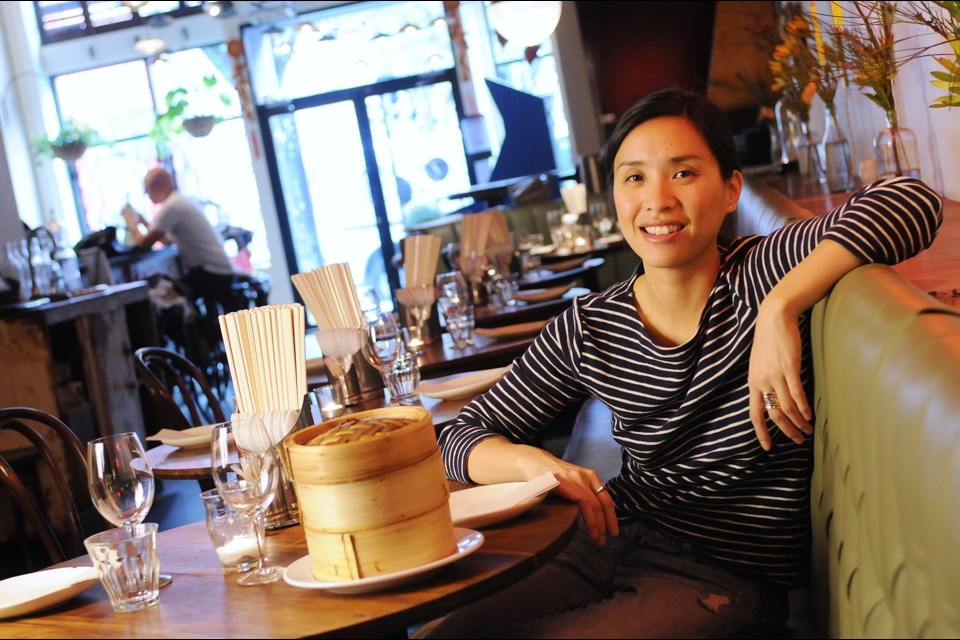Four years ago this month, former bartender Tannis Ling took a deep breath and opened the glass doors to her very own restaurant, Bao Bei Chinese Brasserie in Chinatown.
It was a risky endeavour for a 33-year-old. Few new businesses had opened in the area prior to Bao Bei’s January 2010 opening. Chinatown had garnered a reputation, perhaps unfairly, as a sketchy, unsafe place to be, especially at night, when Ling wanted to operate.
Fast forward to the 50-seat eatery’s fourth anniversary and, by all accounts, the award-winning Bao Bei is consistently packed and Ling is widely touted as having breathed new life into Chinatown.
A few hours before the dinner rush last Wednesday, Ling sat in a booth across from the open kitchen, signed a stack of cheques and recalled the restaurant’s beginnings.
Before she was a restaurant owner, Ling was a popular bartender at the trendy, Chambar. She had earned her chops before that gig tending bar overseas.
Working for others gave her a hankering to have a place to call her own, and her upbringing inspired what she wanted that place to be like.
The idea of family features prominently at Bao Bei — the name itself is Mandarin for “precious,” a term of endearment Ling’s mother used to call her. Ling’s father is an architect, which influenced his daughter’s sense of space and style. Ling also wanted the restaurant to feel peaceful and homey.
The 2,200-square-foot restaurant’s candlelit interior is painted with earth tones and adorned with black and white photos of her family. There are brushed-silver plates on the wall to the right of the entrance and knick-knacks contributed by Ling and other staff throughout, such as the row of decorative white knives on a back wall donated by longtime Bao Bei server Charles Pelletier.
Last Wednesday, beige and red lanterns lined the wall behind the booths in advance of Chinese New Year, which starts this week.
Opening Bao Bei in Chinatown was a no-brainer for Ling, who recalled from her childhood the hustle and bustle on the streets and the colourful, rich smelling ingredients for sale when she would accompany her mother on weekly grocery shopping trips from their home in Kerrisdale.
She wanted to serve the food her mom had always cooked for her, but that came with its own challenges.
“If you are cooking the food that other Chinese people grew up eating then all you get is them comparing it to their mother’s cooking,” she said.
Bao Bei now serves Asian-fusion dishes “with a twist” created by her executive chef Joel Watanabe. Changing the menu didn’t silence all naysayers.
“We get a lot of criticism for not being authentic,” Ling said. “We are just trying to be modern, by taking Chinese food, the traditional flavours, and combining it with what is around us now, what is local, what other cultures exist in Vancouver.”
Complaints have since come from Chinese-Canadians on review websites, such as Yelp, that Bao Bei is overpriced and patronized primarily by white “hipsters,” a reference Ling bristles at.
“It is just a young person who goes out to eat,” she said. Ling and veteran server Pelletier, 36, said they see a wide range of customers, including many Chinese-Canadians.
Concern over who operates and visits Chinatown businesses isn’t just found online.
For some, it points to a political question of how success for Chinatown is defined.
“The folks at Bao Bei are probably booked solid so job well done for them,” said Josh Labove, a PhD geography candidate at SFU who studies the political geography of Vancouver, including gentrification.
“But what is the goal? Is the goal to bring back the Chinese community, is the goal for it to have a mix of all walks of life living in the neighbourhood, is the goal to revitalize the neighbourhood — as if it is in need of revitalization— or is the goal something entirely different, we don’t know.”
For Pelletier there is no question businesses like Bao Bei and the popular nightclub next door, The Keefer, which opened a week after Bao Bei, are good for the area.
“It is definitely changing the face of Chinatown, bringing it back in a way to its original days of being the it spot to go partying,” he said.
For Labove, questions about new businesses go hand in hand with questions about new condo towers in Chinatown — a 17-storey condo complex is under construction next door to Bao Bei. The towers can sell out, but that doesn’t necessarily mean such developments are good for the community, he said.
Ling sits on the Vancouver Chinatown Revitalization Committee, and said she was surprised that established Chinatown members of the committee welcomed the new developments.
“I want to preserve everything and keep everything low and quaint,” she said. “Whereas for them, they see this as a development opportunity for the neighbourhood, for more people to move in, more money.”
Both Ling and Labove agree that Chinatown is complex and historically important. The best direction forward, remains up for debate even as hungry patrons crowd in to Bao Bei.



